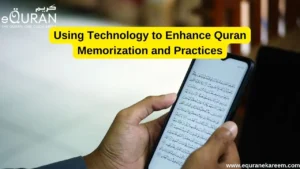The Quran memorization course (Hifz) has seen significant advances in the modern period due to the blending of technology and traditional techniques. This article explores the various ways that technology improves Quranic memory techniques by offering engagement, accessibility, and a well-balanced mix of innovation and tradition.
Accepting Digital Channels
Online Resources for Quranic Memorization:
Online resources for Quranic memorization include interactive elements, structured courses, and a global learning community. By offering a collaborative environment where students may interact with teachers, monitor their progress, and access a wide range of resources, platforms such as “Memorise Quran Online” and “Quran Companion” make memorizing more approachable and engaging.
Mobile Applications for Learning on the Go
Users may get Hifz easily with the use of mobile apps like “Ayat – Al Quran” and “Quran Majeed”. With functions like interactive tests, audio learning, and progress monitoring, these applications transform everyday activities into effective memorizing sessions. Learners can maximize their dispersed time by integrating memorizing smoothly into their hectic life.
Install Quran memorization apps like Memorize Quran for Kids or Quran Majeed to access features such as verse-by-verse memorization, progress tracking, and personalized learning plans on your smartphone or tablet.
Interactive Learning Tools
Virtual reality (VR) and augmented reality (AR)
Immerse experiences are introduced when AR and VR are combined with Quranic memorization. With augmented reality (AR) applications, students can interact with verses in their actual environment by overlapping digital content in the real world. By offering virtual environments that resemble holy locations, virtual reality (VR) goes one step further in improving the memorizing experience.
To visualize verses, ideas, or concepts, use visualization tools like mind mapping software or graphic organizers. Making connections and organizing information in this way helps improve retention.
Methods of Gamification
Gamification infuses Hifz methods with a playful touch. The use of applications such as “Quran Companion” combines competitions, challenges, and benefits to make memorizing fun and engaging. This not only keeps students interested—especially the younger ones—but it also gives them a sense of motivation and success. Additionally, platforms like eQuranekareem offer gamified approaches in their Nazara Quran Course, incorporating interactive games like Quran Star or Quran IQ. These games provide enjoyable challenges and tests, enhancing the memorization process in an interactive and engaging manner.

Enhancing Memorization Techniques
Applications for Flashcards:
Make digital flashcards with Quranic verses and their translations by using apps such as Anki or Quizlet. Spaced repetition techniques are frequently used by these apps to maximize memorization.
Audio Recitations:
Use applications such as Quran Companion or iQuran on a regular basis to listen to audio recitations of the Quran. Repeatedly hearing verses can help with remembering by providing auditory reinforcement.
Taking Digital Notes:
When studying the Quran, take digital notes, underlining important passages, ideas, or topics. Digital material organization and annotation features are available in apps like Onenote and Notepad.
Interactive Websites:
Take a look at interactive websites like Quran.com or Bayyinah TV. They provide features like verse-by-verse translations, discussion, and reading to help with memorizing and deeper understanding.
Integrate social media:
Join online communities or groups on Facebook or WhatsApp to practice memorizing the Quran. Engaging in difficulties, talking about interpretations, and sharing progress may all be encouraging and supportive.
Virtual Study Groups:
Utilize video conferencing platforms such as Zoom or Skype to establish virtual study groups. Memorization can be improved by working together, reciting exercises together, and holding one another accountable.
Aids, both audio and visual
The internet provides a vast library of audio and video content. Praiseworthy Qaris provides learners with access to a variety of recitations that improve pronunciation and melodic voice. Verse illustrations in animated videos appeal to those who learn best visually, providing a multisensory method to memorising.Record yourself reading aloud passages or their translations, then play them again several times. This method improves memorization by combining tangible and auditory learning.
Speech Recognition and Analysis
Speech recognition technology advancements provide students with instant feedback on their readings. Users can practice their speech on apps like “Tarteel” and get immediate corrections. This customized feedback loop guarantees accurate Quran recitation verses and speeds up the learning process.
Addressing Challenges and Concerns
Maintaining Respect in Virtual Environments
It is vital to maintain a feeling of respect on digital media. Developers ought to create platforms and apps with elements that create a hallowed environment, maintaining the spiritual core of Quranic memory in the digital arena.
Managing Screen Time
It’s critical to strike a balance between screen time and conventional techniques. Although technology makes memorizing easier, it should be used in combination with the age-old methods of reciting from hard copies and participating in study circles to provide a comprehensive approach to Hifz.

Conclusion
The combination of technology with the Quranic memorization course by eQuranekareem represents a significant change in the way people interact with the holy book. Through the use of digital platforms, mobile applications, interactive features, and improved memory strategies, students can take part in an engaging educational journey that strengthens their relationship with the Quran and enhances their spiritual growth.
